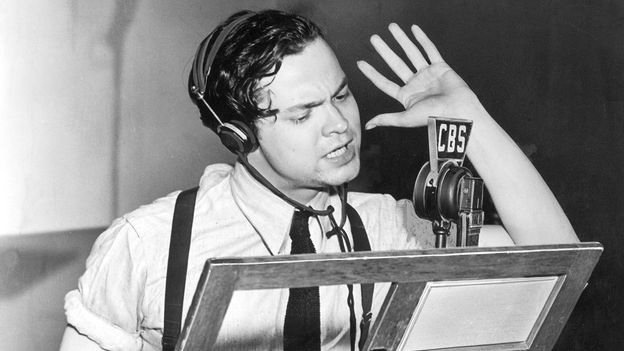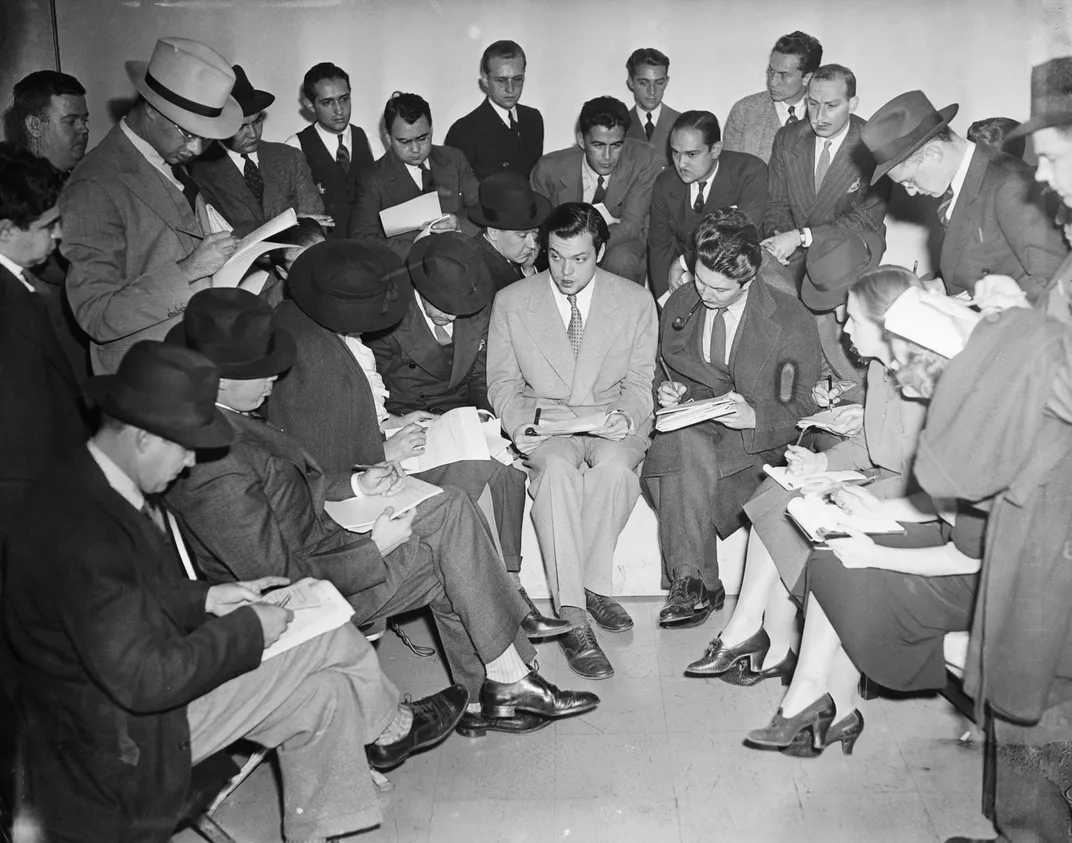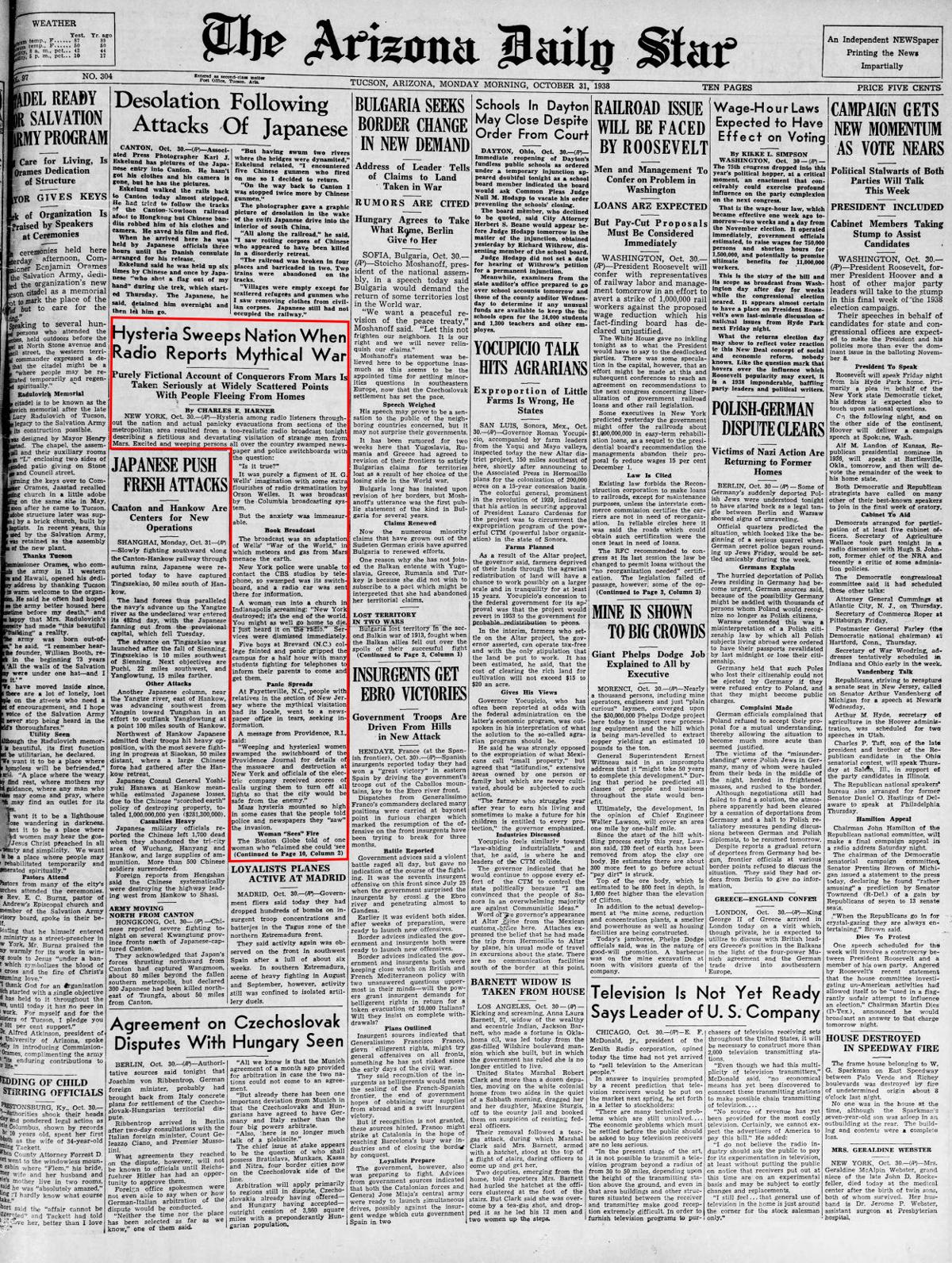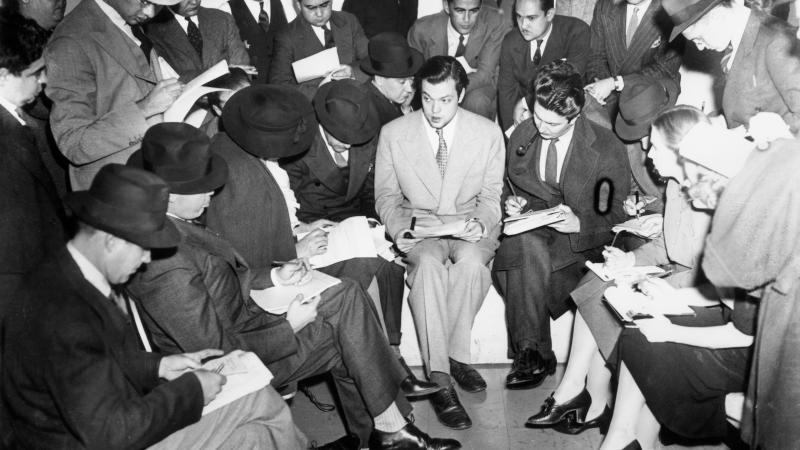Orson Welles’ 30 October 1938 radio adaptation of “The War of the Worlds” caused mass hysteria, convincing thousands of panicked listeners across North America that Earth was being attacked by
Syracuse residents ‘lost their heads’ over ‘War of the Worlds’ in 1938 – syracuse.com
Oct 26, 2023October 26, 2023. Rejoice – or tremble – the 85th anniversary of the War of the Worlds is upon us. The October 30, 1938 broadcast is available here on streaming audio, along with a transcript of the Howard Koch radio play and an account of the press conference following the CBS broadcast, as well as some of the letters to the FCC found in

Source Image: www.bbc.com
Download Image
Orson Welles, 23, reads from his script during the October 30, 1938 broadcast his radio show ‘The War of the Worlds.’ His fictional account of a Martian invasion of Earth created widespread panic

Source Image: www.smithsonianmag.com
Download Image
The Fake News of Orson Welles: The War of the Worlds at 80 | The National Endowment for the Humanities Oct 30, 2013From ‘The War of the Worlds’ broadcast: ‘This is the end now.’. On the evening of Oct. 30, 1938, Orson Welles and his troupe went on the air to say that Martians had invaded New Jersey. Ever since

Source Image: www.nationalgeographic.com
Download Image
Was The War Of The Worlds Broadcast Heard In Boston
Oct 30, 2013From ‘The War of the Worlds’ broadcast: ‘This is the end now.’. On the evening of Oct. 30, 1938, Orson Welles and his troupe went on the air to say that Martians had invaded New Jersey. Ever since The War of the Worlds. Shortly after 8 p.m. on Halloween Eve, 1938, a panicked radio announcer broke in with a news bulletin that Martians had landed in the tiny town of Grovers Mill, New Jersey.
War of the Worlds’: Behind the 1938 Radio Show Panic
Updated: June 1, 2023 | Original: October 30, 2013. As the clock struck 8 p.m. in New York City on the night of October 30, 1938, Orson Welles stood on a podium inside a Madison Avenue radio Oct. 31, 1938: ‘War of the Worlds’ hysteria

Source Image: tucson.com
Download Image
85 years later, “The War of the Worlds” remains an exemplar of audio storytelling | Audible.com Updated: June 1, 2023 | Original: October 30, 2013. As the clock struck 8 p.m. in New York City on the night of October 30, 1938, Orson Welles stood on a podium inside a Madison Avenue radio

Source Image: www.audible.com
Download Image
Syracuse residents ‘lost their heads’ over ‘War of the Worlds’ in 1938 – syracuse.com Orson Welles’ 30 October 1938 radio adaptation of “The War of the Worlds” caused mass hysteria, convincing thousands of panicked listeners across North America that Earth was being attacked by

Source Image: www.syracuse.com
Download Image
The Fake News of Orson Welles: The War of the Worlds at 80 | The National Endowment for the Humanities Orson Welles, 23, reads from his script during the October 30, 1938 broadcast his radio show ‘The War of the Worlds.’ His fictional account of a Martian invasion of Earth created widespread panic

Source Image: www.neh.gov
Download Image
Did the ‘War of the Worlds’ Radio Broadcast Really Cause Mass Panic? — Paleofuture Apr 21, 2023In the annals of radio history, few events have had as profound an impact as the October 30, 1938, broadcast of “War of the Worlds.” This dramatization of H.G. Wells’ classic science fiction novel, adapted by Orson Welles and the Mercury Theatre on the Air, not only showcased the power of storytelling, but also revealed the fragility of public trust in media.

Source Image: paleofuture.com
Download Image
Exploring the Dark Side of Censorship: Halloween Edition Oct 30, 2013From ‘The War of the Worlds’ broadcast: ‘This is the end now.’. On the evening of Oct. 30, 1938, Orson Welles and his troupe went on the air to say that Martians had invaded New Jersey. Ever since

Source Image: www.pinterest.com
Download Image
October 30, 1938 War of the Worlds – Historical Easter Eggs – Today in History The War of the Worlds. Shortly after 8 p.m. on Halloween Eve, 1938, a panicked radio announcer broke in with a news bulletin that Martians had landed in the tiny town of Grovers Mill, New Jersey.

Source Image: todayinhistory.blog
Download Image
85 years later, “The War of the Worlds” remains an exemplar of audio storytelling | Audible.com
October 30, 1938 War of the Worlds – Historical Easter Eggs – Today in History Oct 26, 2023October 26, 2023. Rejoice – or tremble – the 85th anniversary of the War of the Worlds is upon us. The October 30, 1938 broadcast is available here on streaming audio, along with a transcript of the Howard Koch radio play and an account of the press conference following the CBS broadcast, as well as some of the letters to the FCC found in
The Fake News of Orson Welles: The War of the Worlds at 80 | The National Endowment for the Humanities Exploring the Dark Side of Censorship: Halloween Edition Apr 21, 2023In the annals of radio history, few events have had as profound an impact as the October 30, 1938, broadcast of “War of the Worlds.” This dramatization of H.G. Wells’ classic science fiction novel, adapted by Orson Welles and the Mercury Theatre on the Air, not only showcased the power of storytelling, but also revealed the fragility of public trust in media.